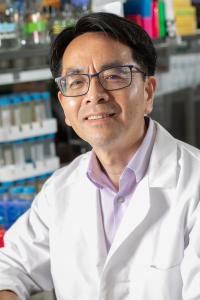Zhiguo Zhang, PhD
- Clyde and Helen Wu Professor of Epigenomic and Molecular Biology (in Pediatrics, Genetics and Development and in the Institute of Cancer Genetics)
On the web

Overview
Zhiguo Zhang, PhD is the Clyde and Helen Wu Professor of Epigenomics and Molecular Biology in the Department of Pediatrics, Genetics and Development, and Institute for Cancer Genetics at Columbia University Irving Medical Center (CUIMC). He has a broad background in biochemistry, genetics, epigenetics and cancer epigenetics. The first long-term goal of his laboratory is to determine how chromatin states are inherited during S phase of the cell cycle and how this process when going awry, leads to genome instability. Specifically, they focus on elucidating nucleosomes, the basic repeat units of chromatin, are re-assembled using both newly synthesized histones and parental histones, following DNA replication using a variety of systems including yeast, mouse embryonic stem cells and human cells.
Dr. Zhang is a member of multiple national and international scientific committees and societies, including the New York Academy of Sciences, American Association for the Advancement of Science and the American Society for Biochemistry and Molecular Biology. He received his PhD in Biochemistry from the University of Utah and his MS in Physical Chemistry from the Dalian Institute of Chemical Physics in China.
Academic Appointments
- Clyde and Helen Wu Professor of Epigenomic and Molecular Biology (in Pediatrics, Genetics and Development and in the Institute of Cancer Genetics)
Credentials & Experience
Committees, Societies, Councils
- 2016-present: Member, New York Academy of Sciences
- 1998-present: Member, American Society for Biochemistry and Molecular Biology
Honors & Awards
- 2009-2014: Scholar, Leukemia and Lymphoma Society
- 1998-2002: Postdoctoral Fellowship from Damon Runyon – Walter Winchell Cancer Research Foundation.
Research
Zhiguo Zhang’s laboratory studies epigenetic inheritance and cancer epigenetics. How epigenetic states are transmitted into daughter cells is a challenging, but yet poorly understood, question in the chromatin and epigenetic fields. Recently, it became clear that epigenetic alterations contribute to tumorigenesis and development of drug. However, how alterations in epigenetic landscape contribute to tumorigenesis and drug resistance is largely unexplored. The laboratory focuses on three major directions to study epigenetic inheritance and cancer epigenetics. First, how parental histones, the primary carrier of epigenetic information, are reassembled into nucleosomes following DNA replication in yeast and mammalian cells. Second, how onco-histone mutations found in gliomas reprogram cancer epigenomes. Third, how epigenetic changes drive drug resistance in brain tumors. The overall goal is to elucidate the molecular mechanisms of epigenetic inheritance and drug resistance and discover novel therapeutics for cancer treatment in the future.
Research Interests: Epigenetic inheritance, Cancer Epigenetics, brain tumors, diffuse midline gliomas, oncohistone mutations and tumor detection by plasma cell free DNA.
Selected Publications
- Han JH, Zhou H, Horazdovsky B, Zhang KL, Xu RM and Zhang Z. Rtt109 acetylates histone H3 lysine 56 and functions in DNA replication (2007). Science 315:653-55.
- Li Q, Zhou H, Wurtele H, Davies B, Horazdovsky B, Verreault A*, and Zhang Z.* Acetylation of histone H3 lysine 56 regulates replication-coupled nucleosome assembly (2008). Cell 134:24455. (This study was highlighted in Cell). PMCID: PMC2597342.
- Yu, C., Gan, H., Serra-Cardona, A., Zhang, L., Gan, S., Sharma, S., Johansson, E., Chabes, A., Xu, R.M. and Zhang, Z. A mechanism for preventing asymmetric histone segregation onto replicating DNA strands (2018). Science, 361,1386-1389.
- Li Z, Duan S, Hua X, Xu X, Li Y, Menolfi D, Zhou H, Lu C, Zha S, Goff, S, and Zhang Z. Asymmetric distribution of parental H3K9me3 in S phase silences L1 elements (2023). Nature, 623: 643-651.
- Zhang X*, Duan S*, Apostolou PE, Wu X, Watanabe J, Gallitto M, Barron T, Taylor KR, Woo PJ, Hua X, Zhou H, Wei HJ, McQuillan N, Kyung-Don Kang7,11, Gregory K. Friedman7,11, Canoll P, Chang K, Hashizume R, Vakoc CR, Wu C, Monje M, McKhann II GM, Gogos JA, and Zhang Z. CHD2 Regulates Neuron-glioma Interactions in Pediatric Glioma (2024). Cancer Discovery, online.
For a complete list of publications, please visit PubMed.gov